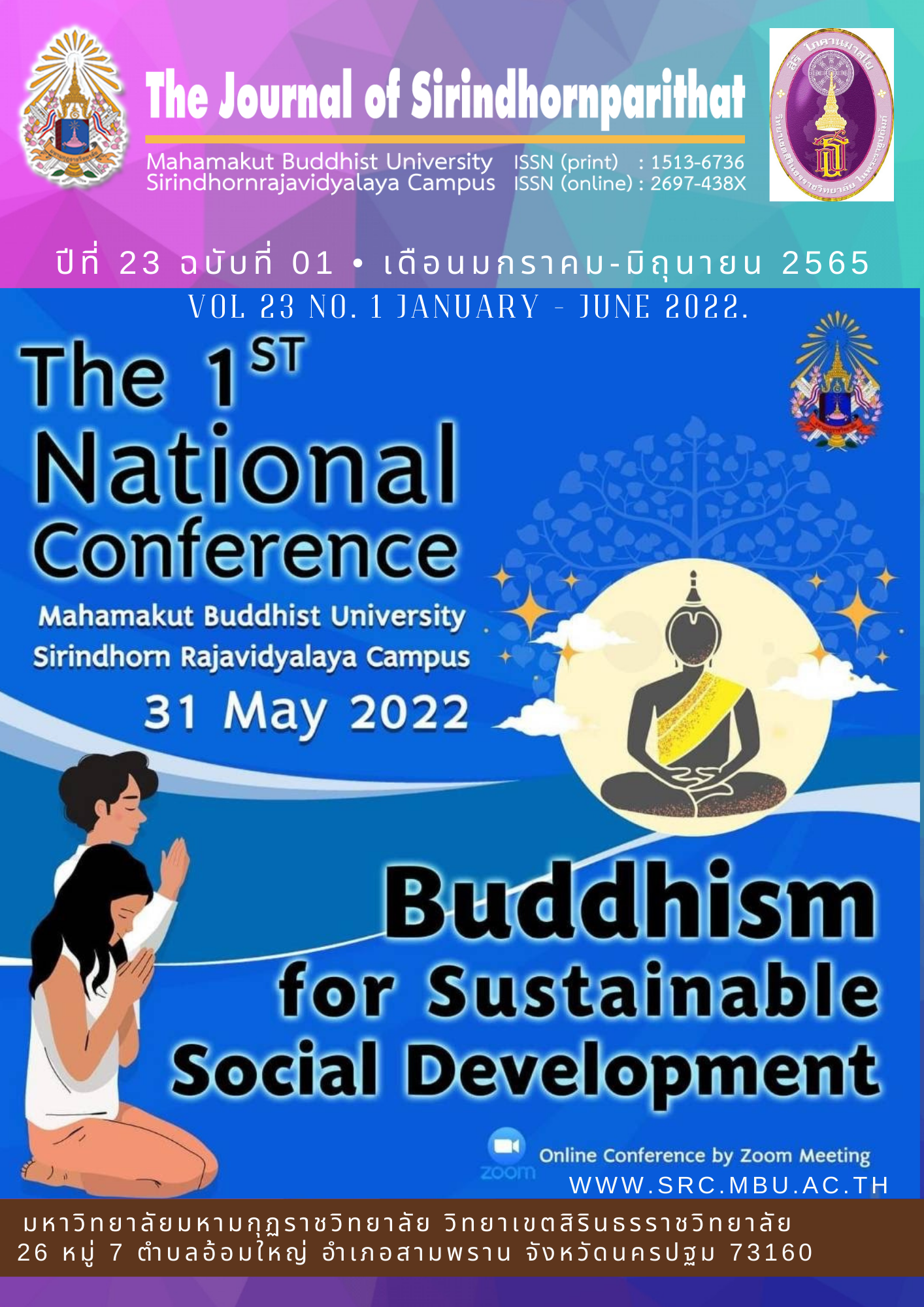โครงการวิจัยและพัฒนากระบวนการผลิตครูคุณภาพฐานสมรรถนะตามแนวทาง การบูรณาการแนวคิดจิตตปัญญาศึกษา ระบบพี่เลี้ยงและการวิจัยเป็นฐาน คณะครุศาสตร์ มหาวิทยาลัยราชภัฏราชนครินทร์
Keywords:
Contemplative Studies, Mentoring research-based systemAbstract
Abstract
The purposes of this research were: 1) to develop competency-based quality teachers production process by Integrating the concept of Contemplative Studies, mentoring, and research-based system, and 2) to evaluate the competency of the first-year students who participated in the development project of competency-based quality teachers production process by Integrating the concept of Contemplative Studies, mentoring, and research-based system. The sample group in this research consisted of 28 first-year students of Competency-Based Curriculum, majoring in Social Studies, Faculty of Education, Rajabhat Rajanagarindra University, 28 mentors from network schools of professional experience practice, and 6 university supervisors from purposive sampling.
The results of this research were as follows:
1) The schools which are the place for practicing professional experience employed the concept of Contemplative Studies, the mentoring system, and the research-based system for development through PDCA process.
2) The first-year students have knowledge, and understanding about the competency integrated with the concept of Contemplative Studies, the mentoring and the research-based system increasingly.
References
กระทรวงศึกษาธิการ. 2562. มาตรฐานคุณวุฒิระดับปริญาตรีสาขาคุรุศาสตร์และศึกษาศาสตร์ (หลักสูตรสี่ปี) พ.ศ. 2562. กรุงเทพมหานคร: กระทรวงศึกษาธิการ.
กรศศิร์ ชิดดี, ศิริพันธุ์ ศิริพันธุ์, กรรณิกา เกตุนิล, มุสลินทร์ โตแปเราะ และนันทนา ทาเลี่ยง. 2562. "จิตตปัญญาศึกษา: กิจกรรมและการประเมินการเรียนรู้สำหรับนักศึกษาพยาบาลศาตรบัณฑิต”. วารสารเครือข่ายวิทยาลัยพยาบาลและการสาธารณสุขภาคใต้. 6 (3) กันยายน-ธันวาคม 2562.
คมสัน ณ รังษี และนพพล ภาณุสุวัฒน์. 2562. การพัฒนารูปแบบการจัดการเรียนการสอนด้วยโครงงาน เป็นฐานร่วมกับแนวคิดจิตศึกษา ของครูโรงเรียนปราณีตวิทยา. รายงานการวิจัย โครงการวิจัยและพัฒนานวัตกรรมแลกเป้า สพฐ. ปีงบประมาณ 2561.
จักรกฤษณ์ จันทะคุณ. 2017. “ผลการจัดกิจกรรมการเรียนรู้ตามแนวคิดจิตตปัญญาศึกษาที่ส่งผลต่อ ความสามารถในการพัฒนาหลักสูตรท้องถิ่นของนิสิตครู มหาวิทยาลัยพะเยา.” Journal of Community Development Research (Humanities and Social Sciences). 10 (4), 2017.
เฉลิมชัย พันธ์เลิศ. 2558. “ระบบพี่เลี้ยง (Mentoring). 9 วิถีสร้างครูสู่ศิษย์: เอกสารประมวลแนวคิด และแนวทางพัฒนาวิชาชีพครูสำหรับคณะทำงาน”. โครงการพัฒนาระบบกลไกและแนวทางหนุนเสริมชุมชนการเรียนรู้ทางวิชาชีพเพื่อพัฒนาผู้เรียน. (อัดสำเนา).
ประเวศ วะสี. 2550. มหาวิทยาลัยไทยกับจิตปัญญาศึกษาและไตรยางค์แห่งศึกษา. กรุงเทพมหานคร: ศูนย์จิตตปัญญาศึกษา มหาวิทยาลัยมหิดลและแผนงานพัฒนาจิตเพื่อสุขภาพ สนับสุนโดยสำนักงานกองทุนสสร้างเสริมสุขภาพ.
ไพโรจน์ คีรีรัฐ. 2555. การจัดการเรียนรู้แบบโครงงานฐานวิจัย. กรุงเทพมหานคร: สำนักงานกองทุน สนับสนุนการวิจัย.
มูนีเราะห์ ยานยา. 2560. ผลของการจัดการเรียนรู้อิงแนวคิดจิตตปัญญาศึกษา กลุ่มสาระการเรียนรู้ สังคมศึกษา ศาสนาและวัฒนธรรม ที่มีต่อผลสัมฤทธิ์ทางการเรียน และความรับผิดชอบทางการเรียนของนักเรียนชั้นประถมศึกษาปีที่ 5. วิทยานิพนธ์ศิลปศาสตรมหาบัณฑิต สาขาวิชาจิตวิทยา บัณฑิตวิทยาลัย มหาวิทยาลัยสงขลานครินทร์.
วารุณี ไหมเมือง. 2556. ผลการจัดกิจกรรมการเรียนรู้แบบจิตปัญญา (Psycho-Intellectual Model) ที่มีผลสัมฤทธิ์ต่อการเรียนหลักภาษาไทย ความคิดสร้างสรรค์ทางภาษา และความพึงพอใจของ นักเรียนชั้นประถมศึกษาปีที่ 3. วิทยานิพนธ์การศึกษามหาบัณฑิต สาขาหลักสูตรและการสอน บัณฑิตวิทยาลัย มหาวิทยาลัยทักษิณ.
วรางคณา ภู่ศิริภิญโญ. 2561. “การพัฒนารูปแบบการจัดการเรียนรู้โดยบูรณาการแนวคิดจิตปัญญา ศึกษาการเรียนรู้โดยใช้วิจัยเป็นฐาน และระบบพี่เลี้ยงเพื่อเตรียมความพร้อมนักศึกษาวิชาชีพครู สาขาภาษาอังกฤษสู่ชุมชน”. วารสารวิชาการ มหาวิทยาลัยราชภัฏบุรีรัมย์. 10 (2) กรกฎาคม- ธันวาคม 2561. หน้า 97-112.
สุธีระ ประเสริฐสรรพ์. 2555. โครงงานฐานวิจัย: การะบวนการเรียนรู้ใหม่ของการศึกษาไทย. กรุงเทพมหานคร: สำนักงานกองทุนสนับสนุนการวิจัย.
Costa, A.L. and Garmston, R.L. 2002. Cognitive Coaching: A foundation for renaissance Schools. (2nd ed.) Massachusetts : Christopher-Gordon.
Geetika. 2019. “Mindfulness and Contemplative Educational Practices for Holistic Education”. MERI Journal of Education. 14 (1) April 2019. Pp. 1-12.
Gottesman, B. 2000. Peer coaching for educators. Lanhan : The Scarecrow.
Hasso Plattner, Christoph Meinel and Larry Leifer. 2010. Design Thinking: Understand Improve and Apply. New York: Springer.
Hudson, Peter B. 2007. “Examining mentors' practices for enhancing preservice teachers' pedagogical development in mathematics and science”. Mentoring & Tutoring: Partnership in Learning. 15(2):pp. 201-217.
Louis Komjathy. 2018. Introducing Contemplative Studies. Oxford: John Wiley & Sons Ltd.
Maryanna D. Klatt. 2017. “A Contemplative Tool: An Expose ´ of the Performance of Self”. Journal of Transformative Education. 15(2). Pp. 122-136.
Miller, A. 2002. Mentoring student & young children: A handbook of effective practice. London: Kogan page.
Mustafa Serdar Terekli and Halil Orbay Cobanoglu. 2019. “Mental Education of Football Referees: Mental Suitcase of Modern Football Referees”. International Education Studies. 12 (3). Pp. 105-115.
Thrope, S. and Clifford, J. 2003. The coaching handbook: An action kit for trainers & managers. London: Kogan Page.

Downloads
Published
Issue
Section
License
Copyright (c) 2022 Mahamakut Buddhist University

This work is licensed under a Creative Commons Attribution-NonCommercial-NoDerivatives 4.0 International License.
บทความที่ได้รับการตีพิมพ์เป็นลิขสิทธิ์ของ มหาวิทยาลัยมหามกุฏราชวิทยาลัย วิทยาเขตสิรินธรราชวิทยาลัย
ข้อความที่ปรากฏในบทความแต่ละเรื่องในวารสารวิชาการเล่มนี้เป็นความคิดเห็นส่วนตัวของผู้เขียนแต่ละท่านไม่เกี่ยวข้องกับหาวิทยาลัยมหามกุฏราชวิทยาลัย วิทยาเขตสิรินธรราชวิทยาลัย และคณาจารย์ท่านอื่นๆในมหาวิทยาลัยฯ แต่อย่างใด ความรับผิดชอบองค์ประกอบทั้งหมดของบทความแต่ละเรื่องเป็นของผู้เขียนแต่ละท่าน หากมีความผิดพลาดใดๆ ผู้เขียนแต่ละท่านจะรับผิดชอบบทความของตนเองแต่ผู้เดียว



